- Bernard Preston homepage
- Greens
- Homemade Sauerkraut Recipe
Homemade sauerkraut recipe
This homemade sauerkraut recipe is made from a cabbage-head and salt; it will be ready to eat in three days.
Add spring-onions, garlic and ginger to turn it into kimchi; and perhaps some chili and turmeric.
This popular German-condiment is so simple to make in your own green kitchen; it's such an easy and very inexpensive introduction to adding probiotics regularly to your platter.
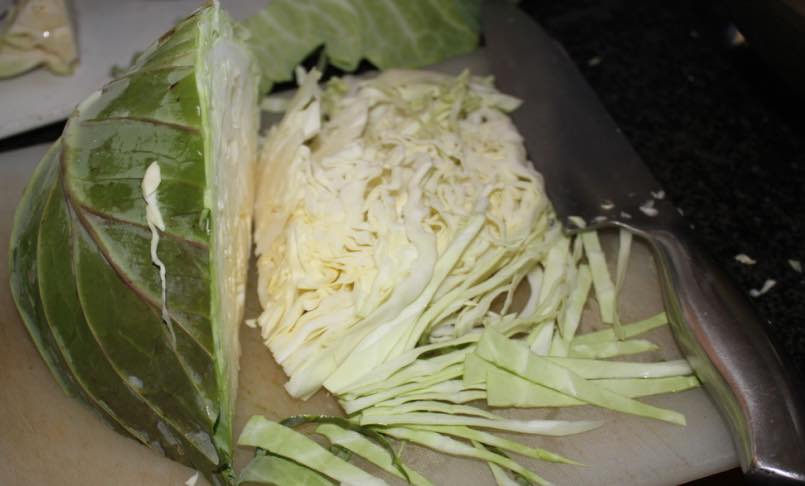
Fermented foods exist in every culture, initially just to preserve them but now we are realising there are many other benefits.
If you are a fast-food person and the salt content of your meals is already too high, then perhaps it is wise to choose another probiotic such as kefir.
Remember a deficiency of salt is just as dangerous as too much. We all need some so our sodium levels do not fall below normal; more about that lower down.
Whether it is because of a concern about the well-being of your intestines, or a realisation that food companies simply cannot make our nosh nearly as tasty as we can ourselves, the decision to ferment your own homemade sauerkraut recipe is absolutely sound.
You will also save a heap of money in the process for very little work.
Homemade sauerkraut recipe
Homemade sauerkraut recipe is so easy to make in your own kitchen. Start with one cabbage but quite soon you may graduate to two if you fall in love with this probiotic; it will depend on the size of your glass fermentation bottle. It needs to be filled to near the top.
Ingredients
- One or two heads of cabbage; save an outer leaf.
- 1.5 tbsp of coarse-salt (roughly 4tsp/kg of cabbage).
- A little unchlorinated rain or spring water.
For kimchi add
- 1 cup of spring-onions
- 1/2 head of garlic
- 1/2 tbsp of grated-ginger
- 1 red-chili without the seeds or 5 peppadews
- 1 tsp of freshly-grated turmeric
Go for it
- Weigh your cabbage.
- Thinly slice the cabbage and thoroughly mix in the sea-salt in a large bowl onto both sides of the leaves. Remove the thick central vein.
- Leave overnight.
- Add the peeled and minced garlic, ginger and peppers; and chopped spring-onions if you are making kimchi.
- Let it stand for about a quarter of an hour to draw the juice out of the cabbage.
- Use a potato-masher or your fingers to thoroughly squish the vegetables for about five minutes.
- Press the vegetables and liquid into a mason jar, food-grade bucket or other glass container with a large mouth; fill to about 5cm from the top adding if necessary more cabbage.
- If necessary add a little water to cover the cabbage; add 1tsp of salt/cup.
- Cut the outer cabbage leaf to the size of the jar, covering the cabbage.
- Press it down and place a small glass bottle nearly filled with water on the cabbage leaf to keep it below the level of the brine. Loosely fit the lid to the mason jar.
- Place the jar on a plate in case it bubbles over as the fermentation occurs. Leave it to stand in a warm, dark spot.
- You can start enjoying your homemade sauerkraut recipe after three or more days; it will start to bubble as the wild yeasts digest the sugars in the cabbage, producing carbon-dioxide. It begins to get that familiar tangy flavour.
- In an aerobic environment the bacteria will start to produce vinegar rather than alcohol.
- Thereafter you can keep it in the fridge for a month or longer. The flavour will get stronger. In many cultures it is a way of preserving cabbage for the whole winter.
* For those unafraid of chewing it's good to finely chop the veins of the cabbage and spinach into your homemade sauerkraut recipe; as in all your cooking. Actually they contain even more of the organic nitrate that keeps the great cardiac vessels supple and blood pressure down.
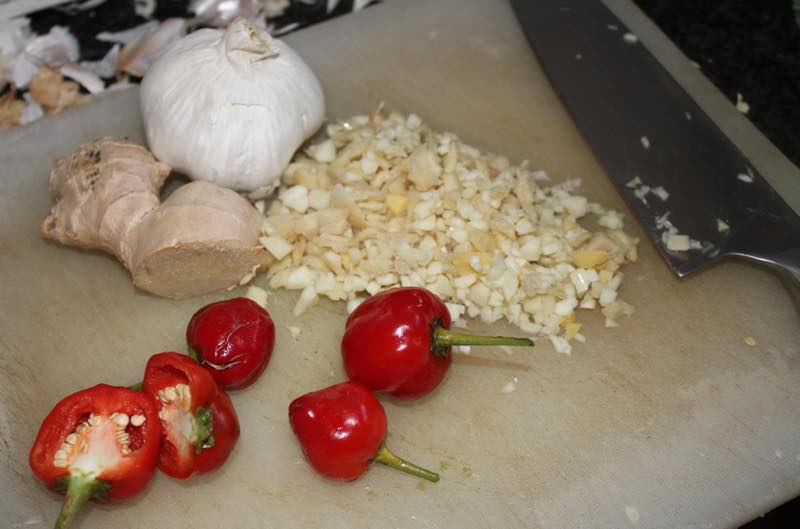
I recommend you start using none of the peppadew seeds; and then in successive trials gradually add more of them until you get the right amount of burn for your family. That's where much of the magic phytonutrient capsaicin is to be found.
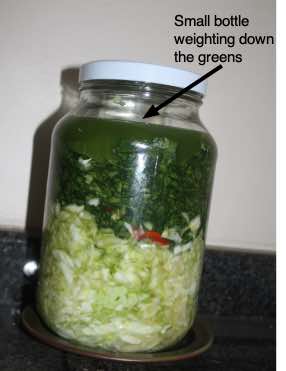 Kimchi with added spinach
Kimchi with added spinachI never follow recipes slavishly. Having made sauerkraut numerous times I love to experiment; on this occasion with spinach to top up the bottle.
Spinach obviously is much more tender than cabbage and one might think it would soon go squishy; not so but do consume it fairly quickly.
Barely seen is a small bottle nearly filled with water in the main jar. It keeps the solids below the level of the liquid; otherwise a mould may form.
In general do not be too concerned about a white mould forming on the surface of fermented foods; just scoop it off.
Refrigerate
Once your sauerkraut has reached the level of tanginess that you desire, from a few days to a couple weeks, place it in the fridge; it will keep for months. If necessary keep topping up with a saline solution; again 1tsp salt per cup of water.
You can now remove the small inner bottle and round of cabbage.
Only use clean utensils for forking out your sauerkraut.
Salt
Salt remains a controversial subject and certainly most of us who eat out regularly probably get too much.
However research shows that too little salt makes you prone to metabolic syndrome, a precursor to cardiovascular disease and high blood-pressure.
A small helping of say two-tablespoons of sauerkraut contains around 300mg of sodium.
So perhaps don't have olives, pizza or a canned soup in the same meal; it is generally recommended you keep sodium below 2300mg per day.
Salt and high blood pressure will give you some tips.
Fermentation
Virtually every culture on the planet has fermented-foods of one kind or another. That might be sauerkraut, yogurt or kefir; and of course, unpasteurised beer and wine.
Healthy bacteria and yeasts feed on the starch reducing the glycemic index and turning it into lactic-acid, alcohol and other compounds.
Fermented foods because the starch has been used up are less fattening. For example, yoghurt does contribute like milk to our waistlines; unless sugar has been added, of course.
In the same way researchers have shown that the fermented-cabbage in your homemade sauerkraut recipe has greater benefits for the obese and diabetic person than coleslaw.
And again this mashed potatoes with sauerkraut bake would also be less glycemic.
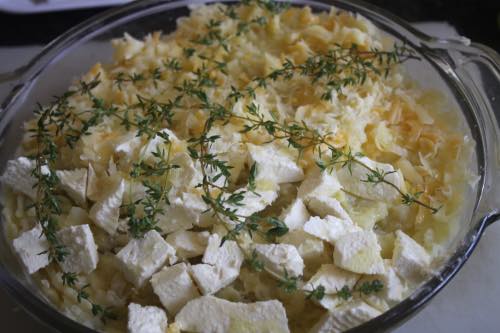
Microbiome
It is astonishing that the happy colon contains about 2kg of friendly bacteria, yeasts and protozoa; with ten times as many cells as there are in our bodies. We are seriously outnumbered by our own bugs unless we have subjected ourselves to massive amounts of antibiotics and chemicals like artificial-sweeteners.
"It turns out that your inflammatory response, the cytokine storm is all about the bacteria in your gastrointestinal tract for any illness, particularly COVID."
- Dr Kim A. Williams, MD, past president of the American College of Cardiology
There is a vast amount of scientific literature now confirming that these bugs have a very beneficial effect on the whole body and in particular, reduce the incidence of conditions like Parkinson's disease, heart-attack and stroke.
In fact these friendly bacteria produce such a huge quantity of essential neurotransmitters that the colon is now being called the second brain. They also have a profoundly beneficial effect on our immune-systems.
What is more should you inadvertently eat food that is laced with pathogens, as we all do periodically the vast army of friendly-bacteria in the gut simply help outnumber the dangerous bugs that can and do make us very sick.
Frequent exposure to antibiotics and all the preservatives and other chemicals added to our processed foods, seriously deplete the friendly flora. Eating fermented sauerkraut and others like kefir on a regular basis is the solution; not swallowing them in pill-form.
"Chaos erupted at a huge party to celebrate the 90th birthday of former Philippine first lady Imelda Marcos yesterday, with 261 friends and supporters rushed to Manila hospitals with suspected food-poisoning. Emergency rooms were inundated with patients vomiting and suffering from diarrhoea and dizziness."
- Reuters, July 4, 2019.
Flavonoids rendered more absorbable
There are many thousands of phytochemicals known as flavonoids that researchers are discovering are absolutely indispensable to our well-being; and they are finding that they are rendered into a more absorbable form in fermented foods like your homemade sauerkraut recipe.
Vitamins
These microorganisms actually synthesise many of the B-vitamins and K whilst in our gut, supplementing those obtained from our food.
They have a role in anti-inflammatory processes in the body; and mop up free radicals, reducing the likelihood of malignant tumours.
Their role is profound; and scientists have only discovered the tip of the iceberg. Rather than becoming neurotic we just need to eat more coloured and fermented foods like this homemade sauerkraut recipe.
And avoid the fast-food restaurants and the plethora of processed stuff that masquerades as sustenance; assuming you want to live long in the land.
Fermented foods reduce anti-nutrients
Another very controversial subject is the role that anti-nutrients have on the absorption of our food. Personally I don't go along with it; it would mean avoiding many of what I believe are vitally important grains, vegetables and legumes.
But anyway fermented foods like this homemade sauerkraut recipe help reduce the levels of phytates and other anti-nutrients that certainly do inhibit to some extent the absorption of minerals from our sustenance.
Digestive problems
Digestion of fibre and any starch in the food that reaches the colon by the friendly bacteria certainly does produce gas and gives some people considerable discomfort; in others it actually relieves bloating. Get to know your own body.
Fermenting that food before we eat it does contribute to a happier intestine.
Newsletter
Our newsletter is entitled "create a cyan zone" at your home, preserving both yourself and Mother Earth for future generations; and the family too, of course. We promise not to spam you with daily emails promoting various products. You may get an occasional nudge to buy one of my books.
Here are the back issues.
- Lifestyle and ideal body weight
- What are ultra-processed foods?
- Investing in long-term health
- Diseases from plastic exposure
- Intensive lifestyle management for obesity has limited value
- A world largely devoid of Parkinson's Disease
- The impact of friendly bacteria in the tum on the prevention of cancer
- There's a hole in the bucket
- Everyone is talking about weight loss drugs
- Pull the sweet tooth
- If you suffer from heartburn plant a susu
- Refined maize meal and stunting
- Should agriculture and industry get priority for water and electricity?
- Nature is calling
- Mill your own flour
- Bake your own sourdough bread
- Microplastics from our water
- Alternative types of water storage
- Wear your clothes out
- Comfort foods
- Create a bee-friendly environment
- Go to bed slightly hungry
- Keep bees
- Blue zone folk are religious
- Reduce plastic waste
- Family is important
- What can go in compost?
- Grow broad beans for longevity
- Harvest and store sunshine
- Blue zone exercise
- Harvest and store your rainwater
- Create a cyan zone at your home
The role of these friendly bugs in our colon on irritable bowel syndrome, gluten intolerance and the more serious conditions like coeliac disease is being fervently researched by the experts.
While solid proof does not yet exist, there are strong indications that fermented foods like your sauerkraut, sourdough bread and kefir have a profoundly beneficial role to play.
There is no need to wait for that solid scientific evidence; we can start benefiting from probiotics in our food even if they do not turn out to be the cure-all that we had hoped for.
On a personal note, I suffered terribly from epigastric pain at night for fifteen years; I had to be very careful what I ate for dinner. One week after starting to make and drink kefir every day almost completely solved the problem. I now take it every few days.
A gastroscopic examination revealed a small hiatus-hernia and a helicobacter infection that would not respond to antibiotics. The friendly bugs in my own homemade medicine overcame the pathogens in just a week. Read more about it at kefir benefits.
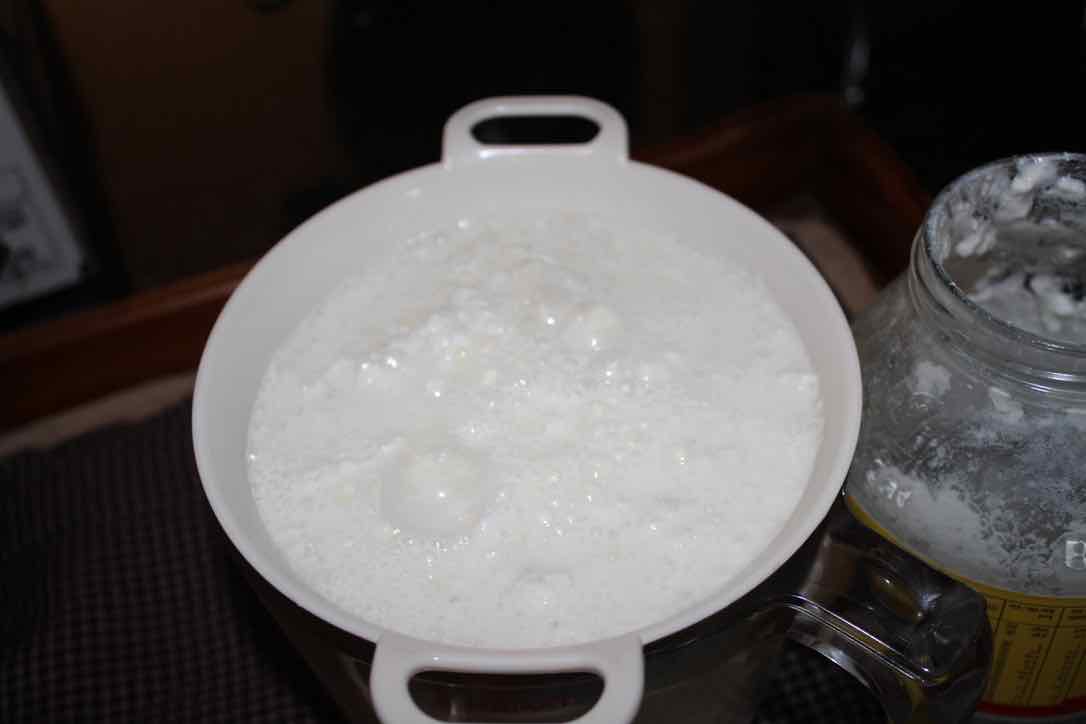
More about salt
New research shows that there is no scientific basis to lower our sodium intake below 2.3g per day; that is about a teaspoon of salt.
If you have high blood pressure then lowering your salt intake to around 2.3 grams would have a moderately beneficial effect. Having even less however might actually increase the risk of metabolic-syndrome.
If you eat out a lot then you almost certainly exceed the recommended sodium intake by double or more; this homemade sauerkraut recipe may exacerbate the problem.
Having said that, if you are venturing into making your own homemade sauerkraut recipe then I doubt you frequent fast-food restaurants on a regular basis.
Enjoying potassium-rich foods is an easier way to deal with hypertension.
Sauer-susu
You can in fact ferment many different foods quite safely. We love this sauer-susu made from the chaote fruit.
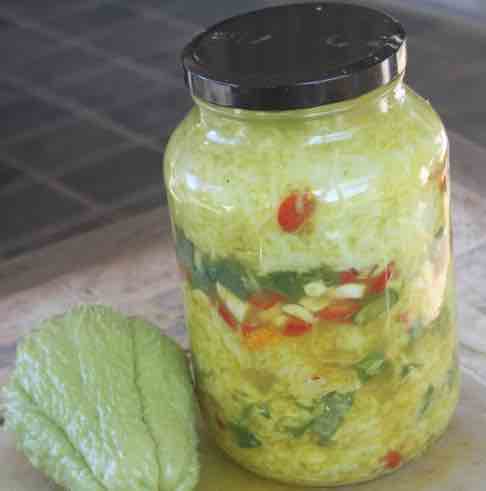
Useful links
When browsing use right click and "Open Link in New Tab" or you may get a bad gateway signal.
Did you find this page interesting? How about forwarding it to a friendly book or food junkie? Better still, a social media tick would help.
- Bernard Preston homepage
- Greens
- Homemade Sauerkraut Recipe
Address:
56 Groenekloof Rd,
Hilton, KZN
South Africa
Website:
https://www.bernard-preston.com